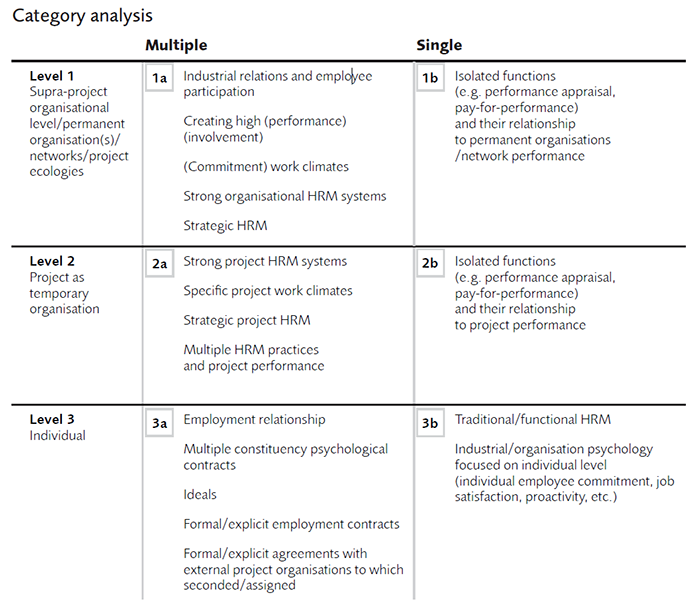Human resource management and project based organising: Fertile ground, missed opportunities and prospects for closer connections
Article highlight
This article reports on publishing trends at the intersection between HRM (human resource
management) and PBO (project based organising) in key research-led journals in the project
management field.
Keywords
- Human resource management (HRM)
- Project based organising (PBO)
- Supra-project organisational level
- Organisational behaviour (OB)
- Project team management
What does the paper cover?
The paper explores the link between HRM and PBO (the HRM-PBO link). It presents an overview of research over a 20-year period, identifying categories of HRM research at three levels of analysis with sub-categories covering single and multiple HRM practices. The analysis highlights the theoretical and methodological resources that can be applied to studies in this field, as well as explicitly identifying the project as a temporary organisation, which makes HRM practices visible.
Methodology
A key word search was undertaken to generate a comprehensive research sample across three main journals in the field of project management: International Journal of Project Management (IJPM), Project Management Journal (PMJ), International Journal of Managing Projects in Business (IJMPB). The search included papers published between 1996 and 2016.
The authors extended Wright and Boswell’s framework of analysis to differentiate between three different levels of the HRM-PBO link: Category analysis In addition, there was differentiation of each level into ‘multiple’ and ‘single’ HRM tasks, classed as the ‘a’ and ‘b’ strand, respectively.
Level 1 - The supra-project organisational level: focusing on HRM in the permanent organisation.
Level 2 - Projects as temporary organisations: focusing on HRM on the project.
Level 3 - The individual level: focusing on HRM and individual roles.
In addition, there was differentiation of each level into ‘multiple’ and ‘single’ HRM tasks, classed as the ‘a’ and ‘b’ strand, respectively.
Research findings
The article outlines findings under the six sub-categories of analysis and identifies missed opportunities and possible future connections.

Figure 1 Adapted and updated from Wright and Boswell (2002) and applied to HRM in project based organisations
Missed opportunities 1996–2016
- There is a lack of research on employment relationships – individual and collective – in the context of PBO.
- Research into practices for direct employee participation and upward problem solving in the context of PBO is not well-developed.
- How organisations harness the benefits of employee participation and organise this participation is a potentially important research domain to study at the organisational level/within multiple practices.
Prospects for closer connections
Theoretical resources for closer connections
Rich theoretical resources are available in the HRM field for different levels of analysis in single or multiple practices. However, a thorough understanding of literature on project management and project based/project oriented organisations from a contextual perspective is essential to ensure theoretical insights on HRM in PBO are well grounded.
Methodological resources for closer connections
Mainstream organisational behaviour-inspired HRM research, drawing on sophisticated multilevel analysis, can be of value in testing if the outcomes found in non-project contexts that are linked to HRM practices are replicated in a project context.
Multi-actor and organisational perspectives for closer connections
The HRM field can benefit from a richer and more highly contextualised focus on the complex, multi-actor, multi-level and multi-organisational setting of projects, which are increasingly prevalent.
Greater research is required to understand the effects of project interactions in terms of the outcomes they shape and the factors that explain these.
There is a need for significant research to examine the impact for both individuals and organisations of HRM in projects.
Conclusions
There is an evolving level of attention for HRM as an important area of project studies.
The introduction of the project as a temporary organisation level of analysis explicitly makes HRM practices more visible in the project.
Projects are increasingly a collection of employees from multiple networks, raising potential research questions for HRM.
The articles discussed in this review can provide a starting point to enrich the HRM field and further strengthen the field of project management.
